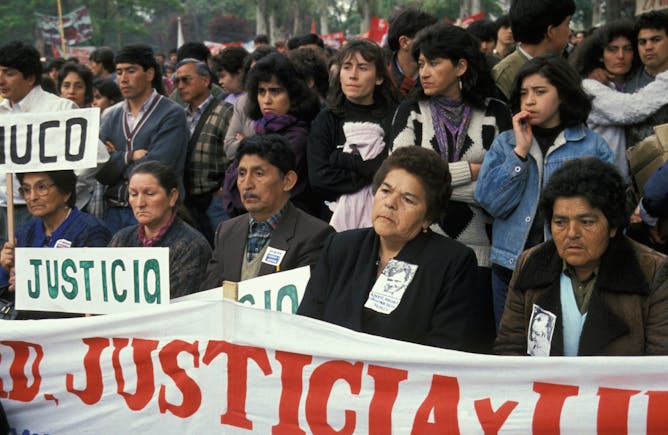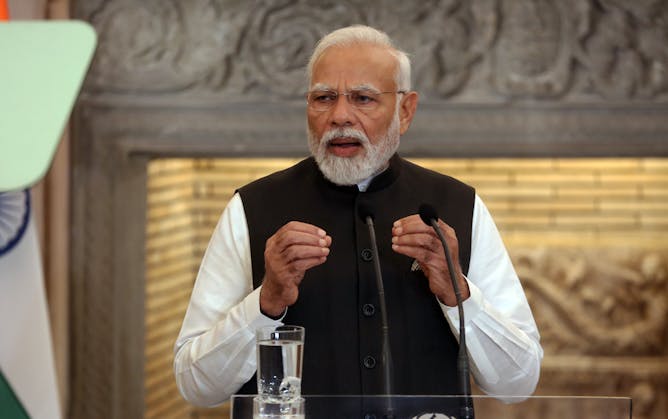|
For the searching mothers of Calama in Chile’s Atacama desert, today has a special meaning that has nothing to do with the attack on New York’s twin towers. Fifty years ago, in the early hours of September 11 1973, a US-backed coup led by General Augusto Pinochet laid the groundwork for an economic project that would inspire both Ronald Reagan and Margaret Thatcher. But Chile under Pinochet was also a catalyst for the torture and enforced disappearance of hundreds of thousands of people throughout South and Central America – using techniques honed at the infamous School of the Americas, a US Defense Department training facility in Georgia.
In our latest Insights long read, Brad Evans, co-director of the State of Disappearance project, traces the modern use of disappearance as a psychological weapon of control. Its currency, he writes, is emotional fear that infects the population like a virus, creating a climate of suspicion and betrayal. Some of those left behind still roam the land for signs of their loved ones.
Elsewhere in the world, Greece was recently hit by devastating flash floods caused by Storm Daniel. So, who better than Ioanna Stamatak, a Greek expert in this type of flooding, to explain why this is part of a pattern of more dangerous weather throughout the Mediterranean region And Nitasha Kaul explains what lies behind suggestions that G20 host India might seek to change its name to Bharat.
|

|
Mike Herd
Investigations Editor, Insights
|
|

Relatives of those who disappeared under the Pinochet regime demand information about their loved ones in Santiago, Chile, in 2000.
Frans Lemmens/Alamy
Brad Evans, University of Bath
State-sponsored disappearance plays into the most primal of human fears – to vanish without a trace. The modern era started with Chile’s US-backed coup on September 11 1973
|

Xinhua / Alamy
Ioanna Stamataki, University of Greenwich
One village recorded 1.5 year’s rain in 18 hours.
|

EPA-EFE/Alexandros Beltes
Nitasha Kaul, University of Westminster
The move to rename India as ‘Bharat’ is part of a push by the Hindu nationalist right to create an ideologically pure state that in reality never existed.
|
Science + Technology
|
-
Sarah Chaytor, UCL; Lucy Shackleton, UCL
The deal will bring relief to UK scientists after Brexit led to uncertainty over funding and collaborative projects.
-
Isabelle Catherine Winder, Bangor University
Rhesus macaques are known for harassing people in New Delhi, where the G20 summit is being held, so authorities are taking action – but is it the right action?
-
Drew Dawson, CQUniversity Australia; Madeline Sprajcer, CQUniversity Australia
Dreams keep our brains ticking over. They wash the thoughts from the day’s events at a molecular level. They might even help us imagine what’s possible during our waking hours.
|
|
Politics + Society
|
-
Mark Honigsbaum, City, University of London
Hundreds of thousands of red hearts adorn a wall directly opposite parliament, yet successive prime ministers have nothing to say about officially marking the lives lost in the pandemic.
-
Dheeraj Paramesha, University of Hull
The Chinese president’s absence at the New Delhi G20 summit sends a message about competition between the two countries.
-
Kateryna Shynkaruk, Texas A&M University
For President Zelenskyy and Ukraine’s citizens, the country’s quest for NATO and EU membership is about security – and identity.
|
|
Arts + Culture
|
-
Hyunseon Lee, SOAS, University of London
Loving portrait of an unrequited love and a cultural divide.
-
Helen Hall, Nottingham Trent University
The Nun II brings a refreshingly feminist gloss to well-worn tropes within exorcism fiction, shattering assumptions about who should be the victim and who should be the rescuer.
|
|
Health
|
-
Adam Taylor, Lancaster University
Sweating is just one of the body’s many processes that help keep us cool.
-
Colin Michie, University of Central Lancashire; Iain Richards, University of Central Lancashire
COVID has spread many times from humans to white-tailed deer and back again.
|
|
Business + Economy
|
-
Helen Wood, Aston University; Jack Newsinger, University of Nottingham; Jilly Kay, University of Leicester
Reality TV workers may not need their own union but they could benefit from joining existing unions serving the creative industries.
|
|
Environment
|
-
Shuo Gao, University of Oxford; Eleanor Jane Milner-Gulland, University of Oxford; Joseph William Bull, University of Oxford; Sophus zu Ermgassen, University of Oxford
Developers can make up for natural habitat loss themselves or pay a restoration fee to the government.
|
|
|
|
| |
|
|
|
|
| |
| |
| |
| |
| |
|
|